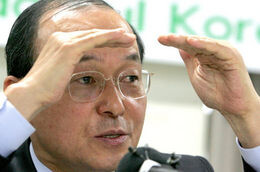hankyoreh
Links to other country sites 다른 나라 사이트 링크
[Interview] Song Min-soon, chief presidential security advisor

President Roh Moo-hyun yesterday presided over a meeting of security-related ministers. After the meeting, Song Min-soon, the President’s chief secretary for national security, explained the countermeasures the South Korean government would undertake following the recent missile tests of North Korea and the subsequent adoption of a U.N. Security Council resolution against the communist regime. Song rejected media reports that U.S. Treasury Undersecretary Stuart Levey expressed concern about the possibility that revenue from the Gaeseong (Kaesong) industrial complex and Mt. Kumkang tours could be used for developing missiles. Levey visited Seoul on July 16-18.
The following is a transcript of the question-and-answer session at the press conference.
Question: Did Levey raise to the South Korean government the problem about [revenue from Mt. Kumkang and the Kaesong industrial park]?
Answer: It is not appropriate to say that he raised the problem. Levey and officials of our government exchanged views on problems regarding financial sanctions against the North and on the U.N. resolution. The officials explained the nature of the Kaesong Industrial Complex and Mt. Kumkang tourism project. In response, before he returned to Washington, Levey said that he understood what we were talking about.
Q: Levey reportedly expressed concern that the capital from inter-Korea economic cooperation could be used to develop weapons of mass destruction.
A: He hasn’t expressed a concern about it. A problem was raised that the U.N. Security Council’s resolution and the Mt. Kumkang and Kaesong projects may conflict with each other, so our side explained about [these projects beforehand].
Q: Were there discussions on the Proliferation Security Initiative (PSI) today?
A: We didn’t talk about it concretely. There were no discussions on additional measures. We just talked about existing measures.
Q: I heard that Japan’s Chief Cabinet Secretary Shinzo Abe is preparing further sanctions against Pyongyang.
A: It is a nation’s sovereign right [to take a position]. However, when the nation requests other countries’ cooperation through the U.N. Security Council resolution, it should follow each nation’s laws and judicial judgment.
Q: The President stressed the stable management of South-North relations. Did he mean that governmental officials [from both sides] can take part in [Korean Independence Day] events?
A: Regarding civil events, it’s up to the civilians to decide whether or not to participate in the events. As far as the role of the government, we need more time to decide. We should not downplay the situation, nor overreact to it.
Q: What is the future direction of the five-way talks?
A: Any one nation cannot lead the five-way talks. All of the five parties must agree. However, prior to this, the government and concerned nations are pushing ahead with the six-party talks. We are considering the five-way talks as a process in which to hold constructive, practical, and progressive six-nation talks. The five-way talks cannot replace the six-nation talks.
Editorial・opinion
![[Column] Season 2 of special prosecutor probe may be coming to Korea soon [Column] Season 2 of special prosecutor probe may be coming to Korea soon](https://flexible.img.hani.co.kr/flexible/normal/500/300/imgdb/original/2024/0426/3317141030699447.jpg) [Column] Season 2 of special prosecutor probe may be coming to Korea soon
[Column] Season 2 of special prosecutor probe may be coming to Korea soon![[Column] Park Geun-hye déjà vu in Yoon Suk-yeol [Column] Park Geun-hye déjà vu in Yoon Suk-yeol](https://flexible.img.hani.co.kr/flexible/normal/500/300/imgdb/original/2024/0424/651713945113788.jpg) [Column] Park Geun-hye déjà vu in Yoon Suk-yeol
[Column] Park Geun-hye déjà vu in Yoon Suk-yeol- [Editorial] New weight of N. Korea’s nuclear threats makes dialogue all the more urgent
- [Guest essay] The real reason Korea’s new right wants to dub Rhee a founding father
- [Column] ‘Choson’: Is it time we start referring to N. Korea in its own terms?
- [Editorial] Japan’s rewriting of history with Korea has gone too far
- [Column] The president’s questionable capacity for dialogue
- [Column] Are chaebol firms just pizza pies for families to divvy up as they please?
- [Column] Has Korea, too, crossed the Rubicon on China?
- [Correspondent’s column] In Japan’s alliance with US, echoes of its past alliances with UK
Most viewed articles
- 1The dream K-drama boyfriend stealing hearts and screens in Japan
- 2‘We must say no’: Seoul defense chief on Korean, USFK involvement in hypothetical Taiwan crisis
- 3[Column] Can we finally put to bed the theory that Sewol ferry crashed into a submarine?
- 4[Editorial] Yoon cries wolf of political attacks amid criticism over Tokyo summit
- 5AI is catching up with humans at a ‘shocking’ rate
- 6S. Korea “monitoring developments” after report of secret Chinese police station in Seoul
- 7Doubts remain over whether Yoon will get his money out of trip to Japan
- 8[Photo] “Comfort woman” survivor calls on president to fulfill promises
- 9[Editorial] Was justice served in acquittal of Samsung’s Lee Jae-yong?
- 101 in 5 unwed Korean women want child-free life, study shows